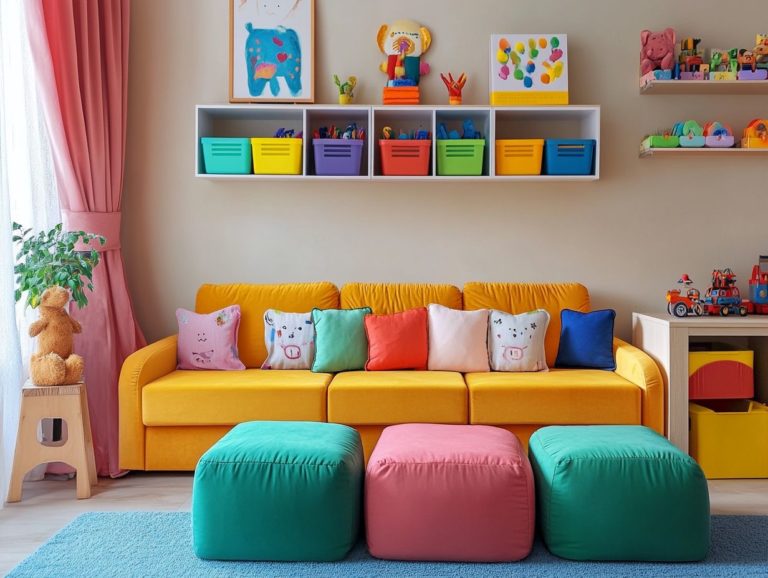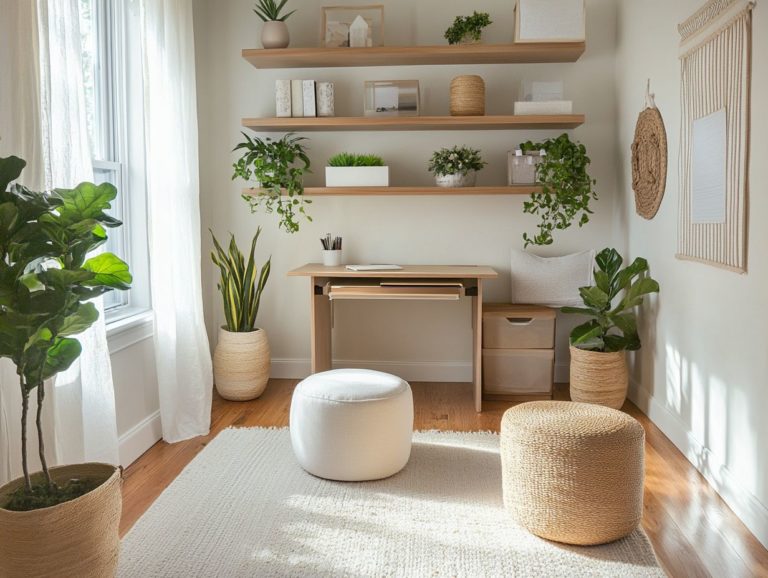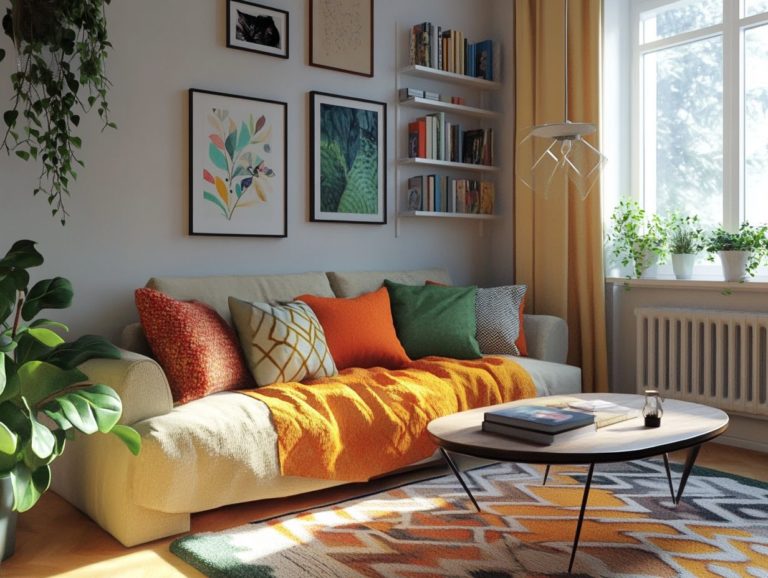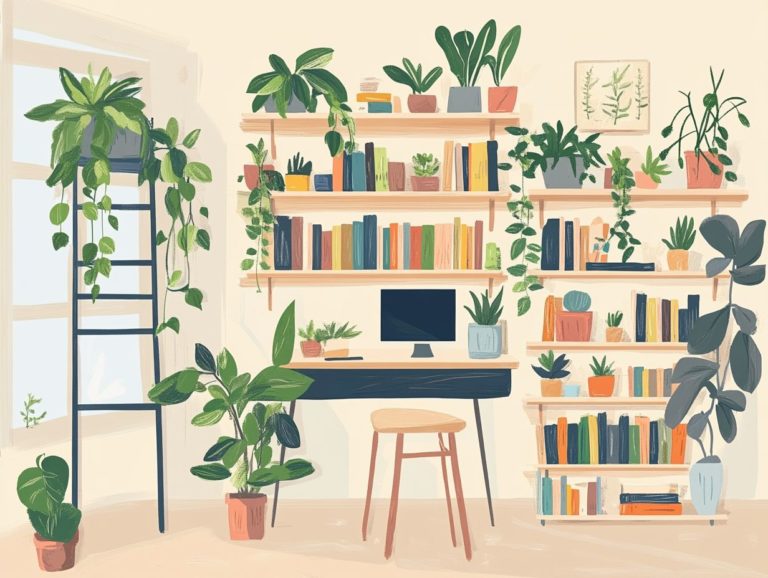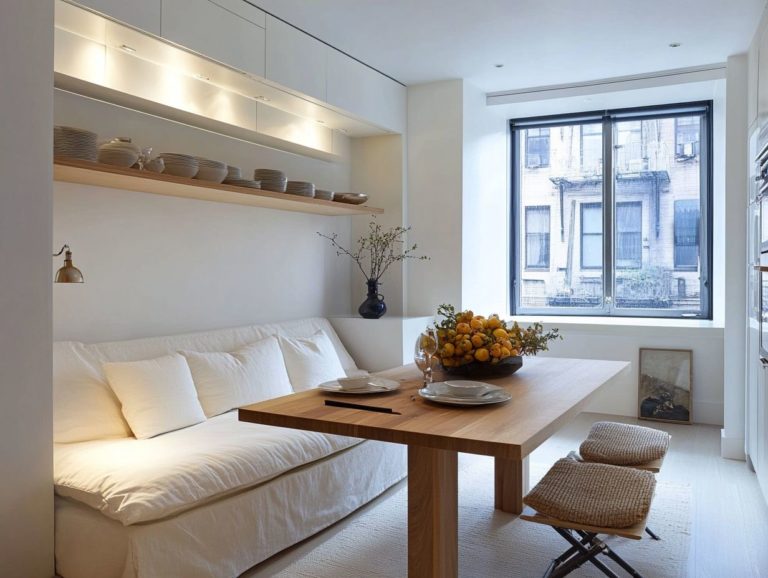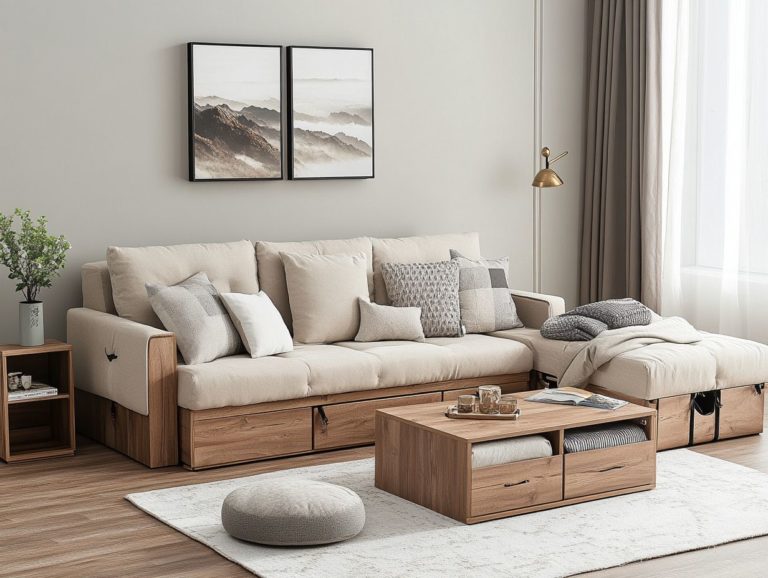The Psychology of Space and Clutter
Your surroundings play a crucial role in shaping your mental state, influencing how you feel and behave each day. Clutter can feel like a weight pressing down on your mind, often resulting in heightened stress and anxiety.
Conversely, an organized space can foster clarity and tranquility. Discover how your surroundings can transform your mental health!
This article examines the relationship between your physical and mental environments, exploring the psychological impacts of clutter and offering practical strategies for decluttering. You’ll discover the advantages of embracing a minimalist lifestyle and how mindfulness can create a more serene existence.
Embark on this journey toward a clearer mind and a more harmonious living space.
Contents
- Key Takeaways:
- The Impact of Space and Clutter on Our Minds
- Psychological Effects of Clutter
- Organizing and Decluttering Tips
- The Connection between Minimalism and Mental Well-being
- Creating a Mindful Environment
- Frequently Asked Questions
- What is the psychology behind the need for space and clutter?
- How does clutter affect our mental health?
- Why do some people have a higher tolerance for clutter than others?
- Can the organization of our physical space impact our productivity?
- How can we create a more positive and functional space?
- Is there a connection between our mental state and the physical state of our environment?
Key Takeaways:
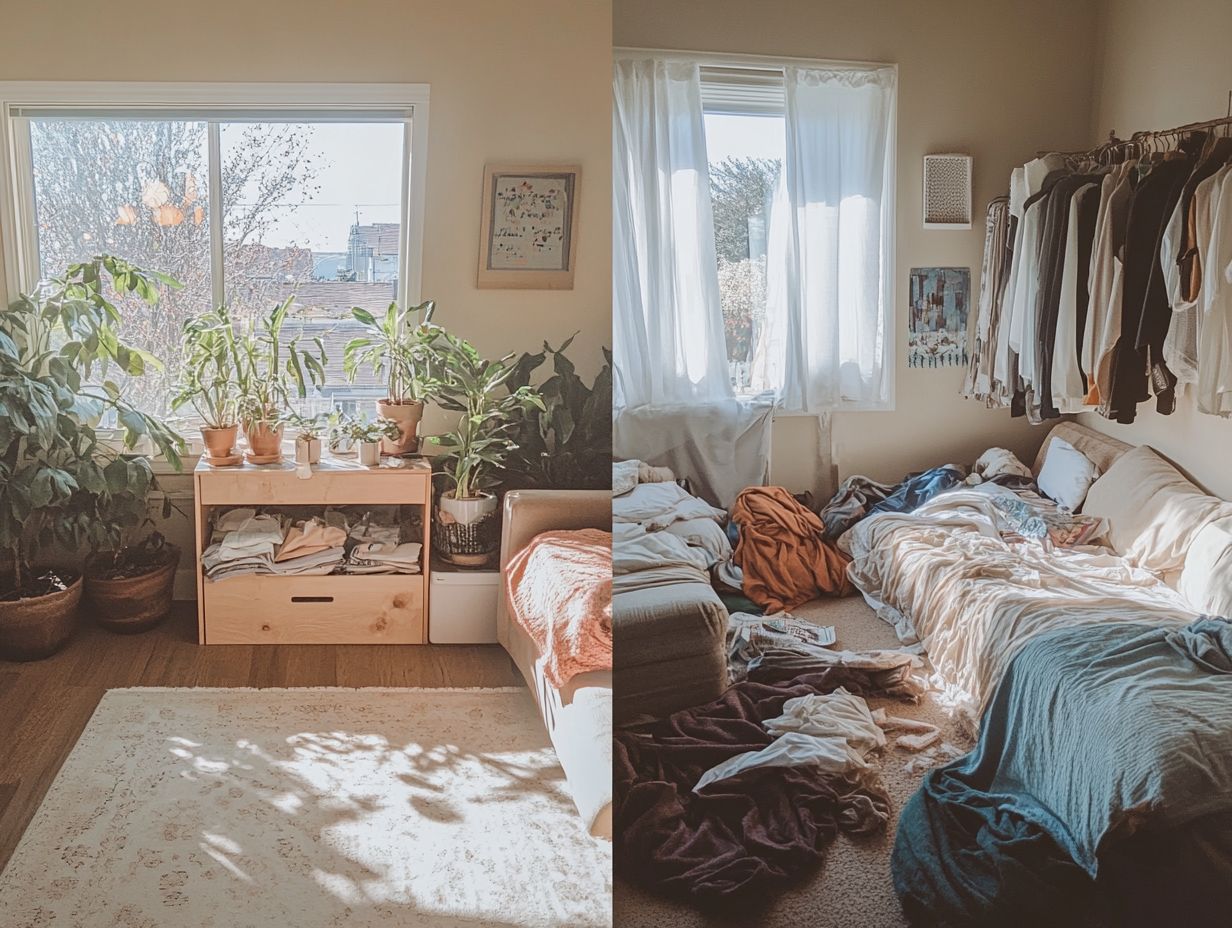
- Physical and mental space are closely intertwined, with clutter negatively impacting our minds and well-being.
- Clutter can affect our mood and behavior, leading to feelings of stress, anxiety, and overwhelm.
- Adopting a minimalist lifestyle and regularly decluttering can promote mental well-being and create a more peaceful environment.
The Impact of Space and Clutter on Our Minds
The impact of space and clutter on your mind is a complex interaction between environmental psychology the study of how our surroundings affect our minds and mental health. This reveals how your physical surroundings can influence your emotional well-being.
Research from Princeton University indicates that cluttered environments can elevate cortisol levels, resulting in heightened stress and anxiety. Chaos in your personal space can disrupt productivity and impair decision-making abilities.
The psychological roots of clutter often arise from emotional attachments, making decluttering not just a chore but a therapeutic effort that enhances mental health and enriches your quality of life.
Understanding the Relationship between Physical and Mental Space
Understanding the relationship between physical and mental space shows how your environment can reflect and influence your mental state, showcasing the principles of environmental psychology. Physical clutter often leads to chaos in your mind, resulting in disorganized thoughts that hinder your decision-making skills.
When you encounter disorganized surroundings, your mind is frequently overstimulated by visual distractions, making it increasingly challenging to focus on tasks. For instance, a cluttered desk can evoke feelings of overwhelm, distracting you from productivity and turning even simple tasks into monumental challenges.
On the flip side, a tidy space fosters calm and control, allowing for clearer thought processes and enhanced creativity. By incorporating organization systems like designated storage solutions or minimalist design principles you can cultivate peace and clarity, positively impacting your emotional well-being.
Psychological Effects of Clutter
The psychological effects of clutter can be profound, contributing to increased anxiety, depression, and decision fatigue. Clutter creates a sense of overwhelm that weighs heavily on your mental health, stemming from psychological and emotional reasons for holding onto items.
Your emotional attachment to possessions complicates the decluttering process, often leading to procrastination. This accumulation of items stresses your living spaces and extends that burden to your mind, making it increasingly difficult to find clarity and peace.
Start decluttering today for a happier mind and home!
How Clutter Affects Our Mood and Behavior
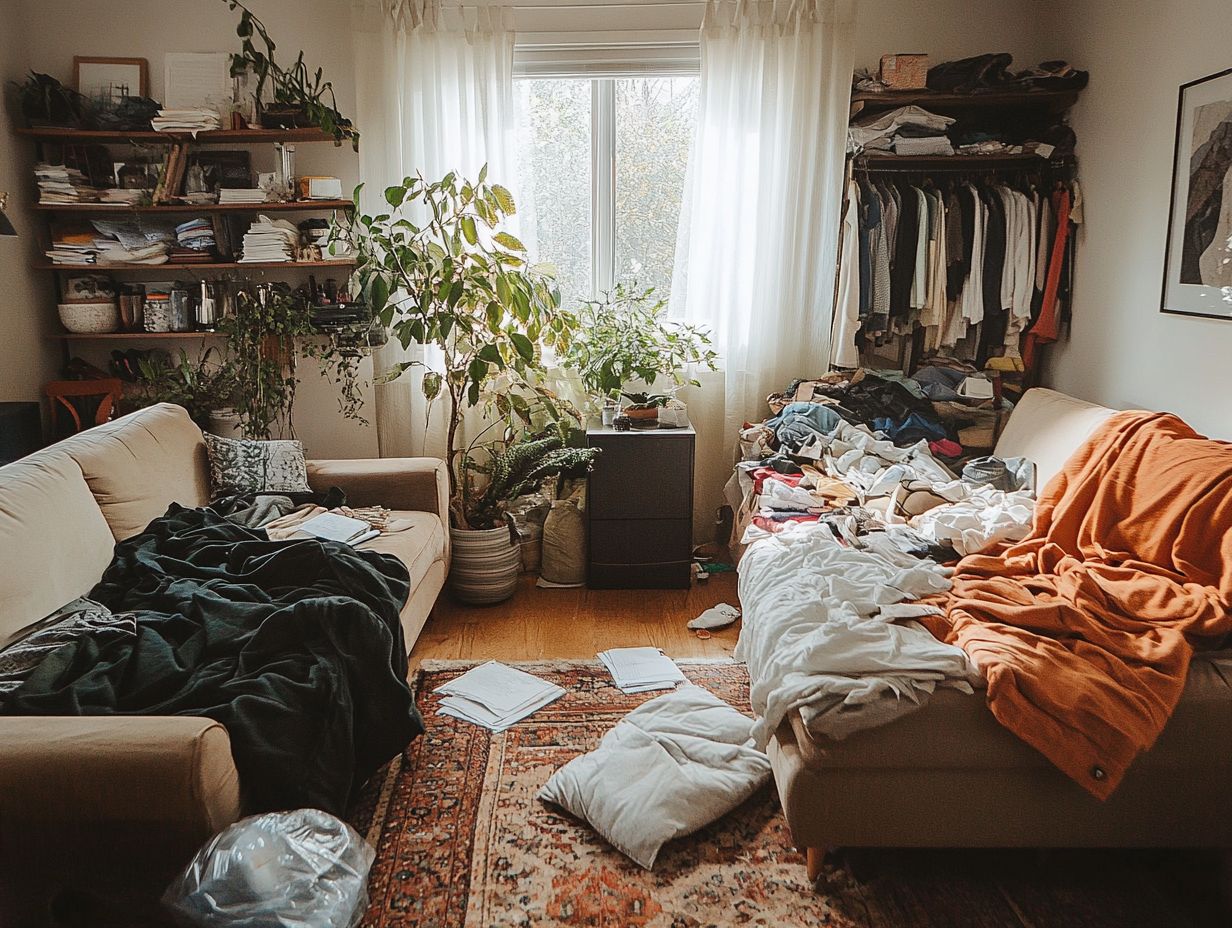
Clutter profoundly impacts your mood and behavior. Studies show that messy environments increase stress and irritability.
This chaotic atmosphere disrupts your emotional state. It also makes mindfulness practices harder to follow.
Research indicates that cluttered spaces make it difficult to focus. This often leads to decreased productivity and feelings of being overwhelmed.
The distractions of clutter can invite negative emotions, potentially leading to anxiety or frustration.
To counter these effects, consider incorporating organizational tools. Decluttering systems and smart storage solutions can create a more serene environment.
Embracing mindfulness techniques, like regular meditation sessions or brief breathing exercises while tidying up, can help redirect your focus. This fosters positive emotions and alleviates stress levels.
By consciously addressing clutter, you can cultivate a calming sanctuary that significantly enhances your overall mental health.
Organizing and Decluttering Tips
Organizing and decluttering are essential practices for enhancing your mental well-being. They improve the efficiency of your space and help alleviate stress.
This process can also be therapeutic, offering relief from the burden of cluttered homes.
By implementing effective storage solutions and organizational tools, you can embark on a transformative journey. Revitalizing your living spaces creates an environment that promotes productivity and peace, especially in areas like your home office.
A clutter-free office mitigates the effects of sensory overload.
Strategies for Maintaining a Clutter-Free Space
Implementing strategies for a clutter-free space is vital for preserving an organized environment. This nurtures your mental well-being and minimizes stress.
Embracing a minimalist mindset helps you develop proactive cleaning habits. It sharpens your decision-making skills and allows you to commit to organization and clarity.
One effective technique is to establish a regular cleaning routine. Dedicating just a few minutes each day to tidy specific areas significantly reduces the overwhelm of larger cleaning tasks.
Utilizing storage solutions like bins and labeling systems creates a designated spot for every item. This makes it easier to find what you need without rummaging through clutter.
Such organization supports your life skills as you manage your personal space effectively.
The psychological benefits are profound. A clear space can lead to an improved sense of control and decreased anxiety, often resulting in a clearer mind.
These habits foster behavioral changes, promoting a space that is both productive and tranquil.
The Connection between Minimalism and Mental Well-being
The relationship between minimalism and mental well-being is increasingly acknowledged. Embracing a minimalist lifestyle reduces clutter, eases decision fatigue, and improves your quality of life.
This makes it easier to confront the psychological challenges associated with disorganized environments.
Releasing unnecessary possessions liberates you from emotional attachments that burden your mental health. This creates space for a more focused and fulfilling existence.
This process often involves confronting the psychological reasons behind accumulated items.
Start your decluttering journey today for a happier, more peaceful life!
Exploring the Benefits of a Minimalist Lifestyle
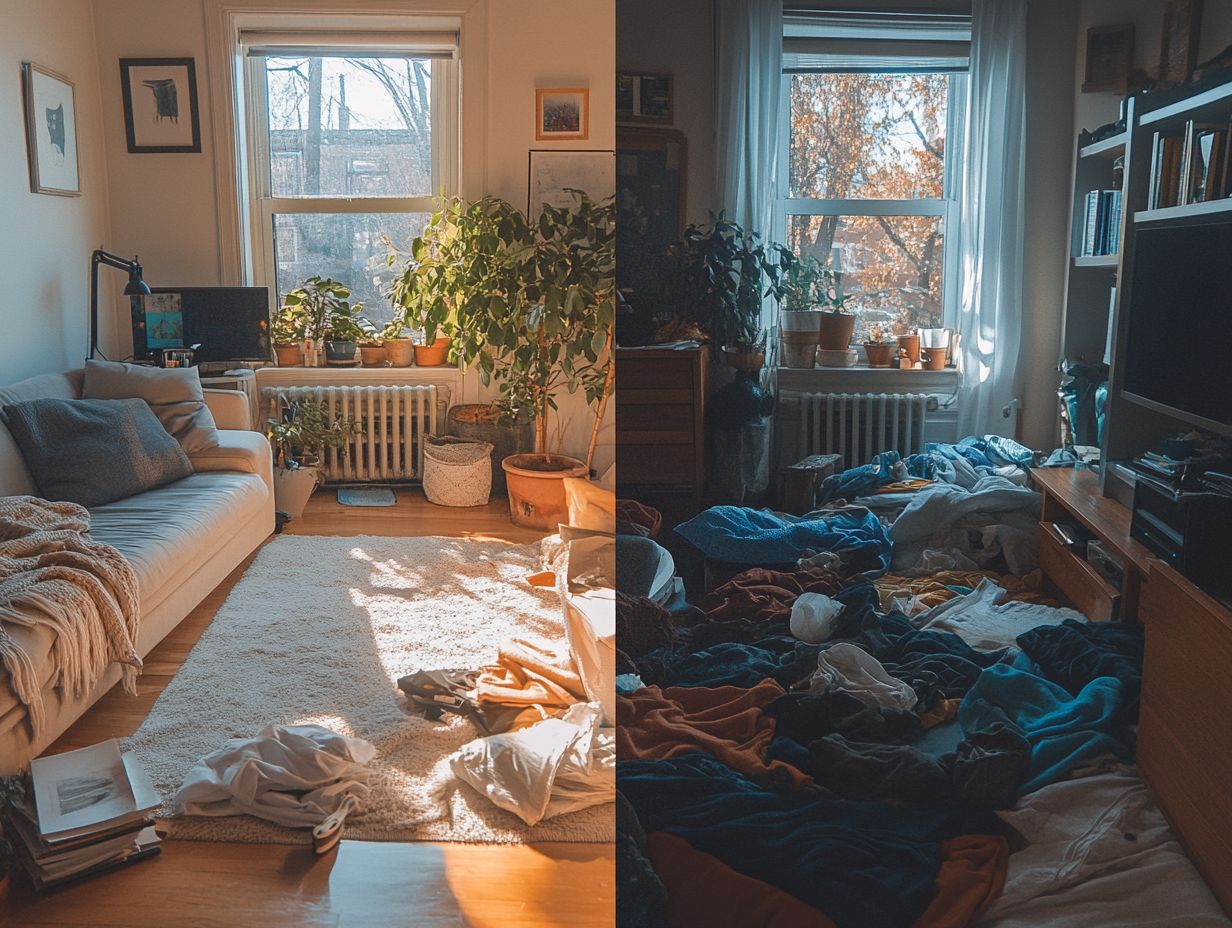
Exploring the benefits of a minimalist lifestyle reveals that it s not just about having fewer possessions. It s about cultivating a clutter-free life that enhances your mental well-being through increased mindfulness and emotional clarity.
By intentionally surrounding yourself only with meaningful items, you create a peaceful sanctuary in your living space. This deliberate reduction in physical distractions opens up incredible opportunities to connect with yourself and your surroundings.
Many individuals who have embraced minimalism report remarkable improvements in their emotional stability. This shift allows them to focus on what truly matters in their lives, even enhancing their life skills.
Take, for instance, a young professional who shared that donating excess clothing not only decluttered her closet but also liberated her mind. This enabled her to pursue her passions with renewed energy, illustrating how emotional attachment can be overcome through community service.
Ultimately, embracing minimalism sharpens your organizational skills and helps you keep things organized in various aspects of your life. This cultivates a serene environment that is conducive to personal growth and fulfillment.
Creating a Mindful Environment
Creating a mindful environment is crucial for nurturing your mental well-being. It encourages you to be present and focused in your personal spaces, helping to alleviate the effects of anxiety and depression.
By prioritizing space efficiency and organization, you can design areas that foster clarity, creativity, and a sense of tranquility. This effectively minimizes clutter and the stress that often accompanies it, mitigating the impacts of sensory overload.
Incorporating Mindfulness into Our Physical Space
Incorporating mindfulness into your physical spaces means creating environments that exude tranquility and organization. This practice not only declutters your space but also reduces stress levels by fostering a sense of control and well-being.
By embracing techniques like minimalism, you can streamline your environment, keeping only those items that inspire joy and serve a purpose. Organizing your spaces with a designated system can make daily tasks feel less overwhelming, enhancing your overall efficiency.
Integrating natural elements like plants and calming colors can cultivate a serene atmosphere that significantly boosts your emotional health. These mindful practices forge a powerful connection between your environment and your psyche, ultimately leading to improved mental well-being.
Understanding how your surroundings impact your mood and stress levels, including the effects of digital clutter and disorganized space, empowers you to create restorative spaces that nurture both your body and mind.
Frequently Asked Questions
What is the psychology behind the need for space and clutter?
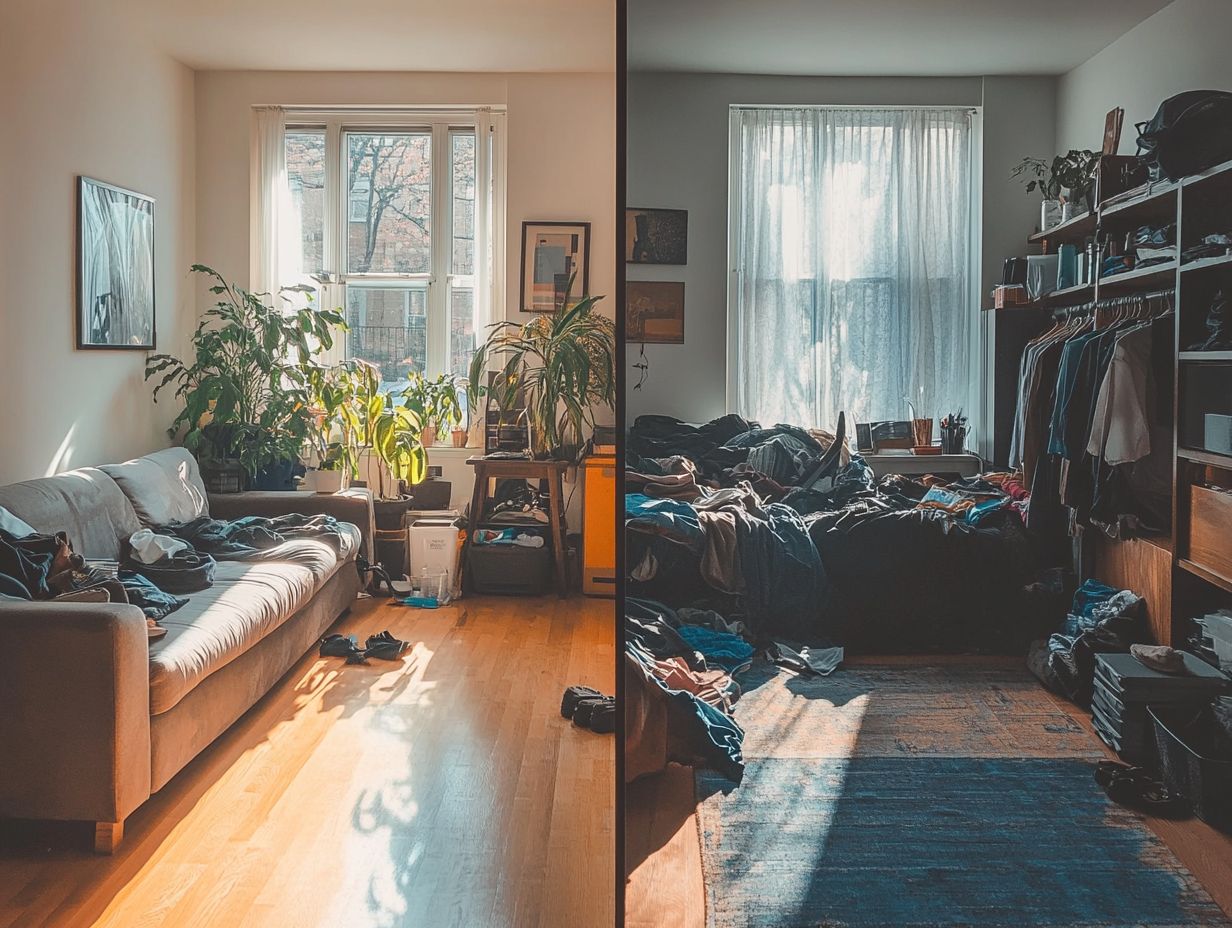
The psychology of space and clutter refers to the study of how our physical surroundings impact our mental well-being and behavior. It explores the relationship between our environment, our thoughts, and our emotions.
How does clutter affect our mental health?
Clutter has been linked to feelings of stress, anxiety, and overwhelm. It can make it difficult to focus and can even lead to feelings of guilt and shame for not being able to keep a tidy space.
Clutter can also cause physical health problems, such as allergies and respiratory issues.
Why do some people have a higher tolerance for clutter than others?
Individuals have different levels of tolerance for clutter, influenced by factors such as upbringing, personal preferences, and mental health. Some people may find clutter comforting and a representation of their identity, while others may see it as a source of stress and chaos.
Start your minimalist journey today for a clearer mind and a happier life!
Can the organization of our physical space impact our productivity?
Yes, the layout of our physical space greatly affects our productivity. A cluttered environment can be overwhelming and hard to focus in. In contrast, a tidy space boosts concentration and motivation.
How can we create a more positive and functional space?
Start by decluttering your environment. Remove items that you no longer use and find effective storage solutions.
Designate specific areas for different tasks. Regularly tidy up to maintain a functional space and prevent overwhelm.
Is there a connection between our mental state and the physical state of our environment?
Yes, there is a strong link between our mental state and our surroundings. A chaotic space can increase stress and anxiety, while a clean area promotes calm and control.
Improving your environment can positively influence your mental well-being.

